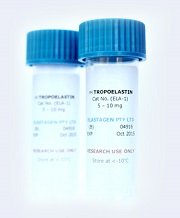 |
| Tropoelastin--Courtesy of Elastagen |
Sydney, Australia's Elastagen received AU$13 million ($9.1 million) to deploy its platform technology to formulate the protein tropoelastin to improve aesthetics, remodel scar tissue and repair tissue.
The company says it is the first and only provider of clinical-grade human tropoelastin, which it says has unique physical elastic properties, and supports cell growth and tissue repair.
According to a release, Elastagen is about to commence a clinical trial to evaluate safety and efficacy of an intradermal tropoelastin implant to reduce the appearance of stretch marks. In addition, the company is developing an injectable skin rejuvenation product and a novel tropoelastin-based product for wound repair.
Financiers include new investors Korea Investment Partners, Amorepacific Ventures and the Wellcome Trust. Existing investors Brandon Capital Partners, GBS Ventures and ATP Innovations also participated in the Series B round.
"We are delighted to have the leading Asian dermatology and beauty focused fund Amorepacific Ventures, one of Korea's largest life science venture investors in KIP, and the prestigious charitable foundation the Wellcome Trust as investors in Elastagen," said Elastagen CEO Robert Daniels in a statement. "Our ability to attract such investors is a reflection of the progress we have made and the exciting times which lay ahead for the Company. Along with the closure of the financing we are very pleased to welcome Sangwoo Lee of KIP to our Board of Directors."
According to the product website, the company already sells its recombinant human tropoelastin to other researchers.
The protein is described as a "key mammalian extracellular matrix protein that is critical to the elasticity, compliance, and resilience of a range of tissues including the vasculature, skin, and lung. In addition to providing mechanical integrity to tissues, elastin also has critical functions in the regulation of cell behavior."
- read the release